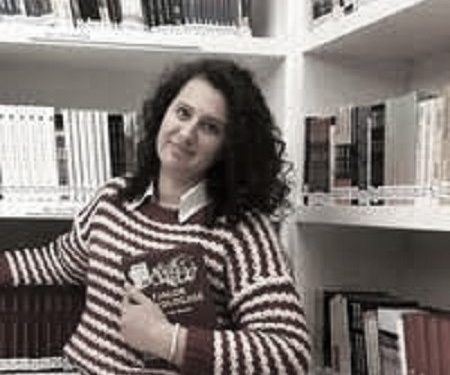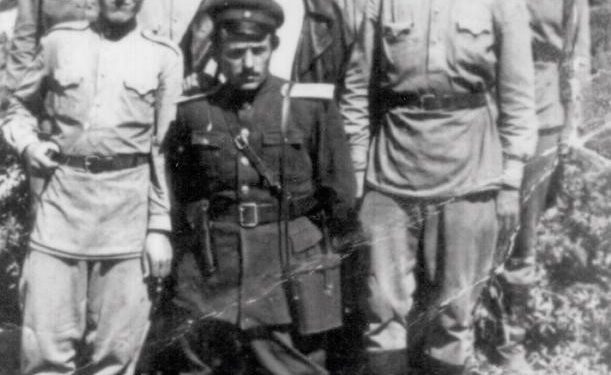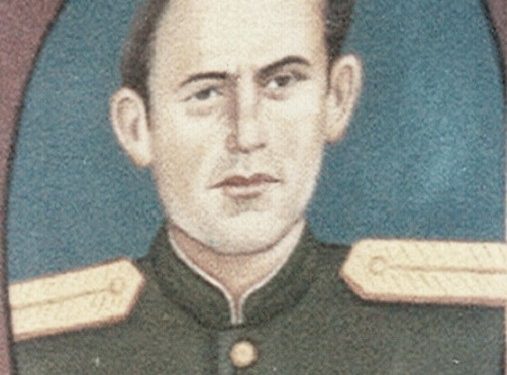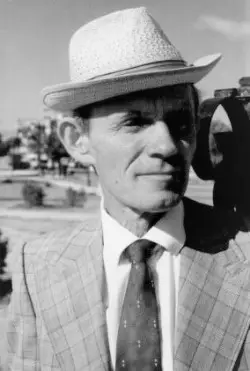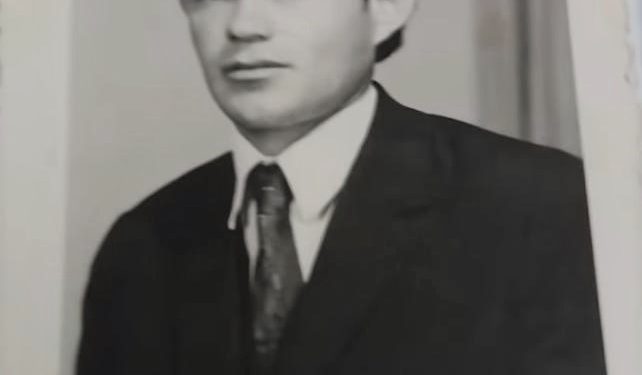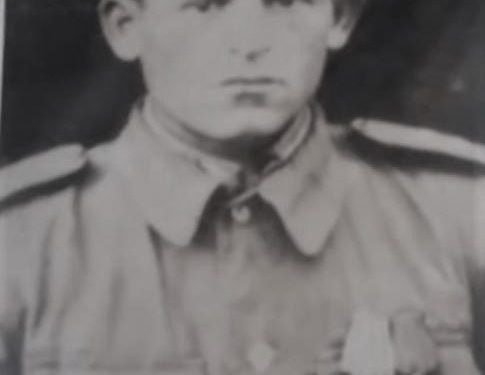By Najada Pendavinji
Memorie.al / Vasil Zoga is one of the victims of communist crimes, experiencing an ordeal of persecution and punishment in Spaç. It all started with the shooting of his brother, Jani Zoga. Vasili was born in 1939 and comes from a simple working family from the village of Shtikë in Kolonje. His dream of becoming a doctor was interrupted in the middle, but he practiced the profession of a doctor in Spaçi prison and in exile all his life. On July 8, 1976, he was arrested after demanding justice for the shooting of his brother. The meeting with Prime Minister Mehmet Shehu almost cost him his life, but with the expression: “The Party knows these things”, he would accept the fate that the Party assigned him, being sentenced to 10 years in prison “for agitation and propaganda” and “overthrow of popular power”. He served his sentence in Spaçi prison, where he remembers the violence and inhumane torture that took place there. He was released in 1986, returning to his family already settled in Karbunarë-Lushnje, where he was not allowed to practice his profession as a doctor, but worked as a shepherd. Although many years have passed, his only wish is to find the remains of his brother Jani Zoga, shot by the communist regime.
Full testimony of Doctor Vasil Zoga, former political prisoner
Mr. Zoga, where were you born and what is your family background? How and why did the persecution of your family by the communists begin?
I was born in the village of Shtikë in the district of Kolonje, from a poor family with many members who worked for a living, as Albania was at that time. Despite this, we have not lacked patriotism and thirst for freedom. We were a family, like all Albanian families, where during the National Liberation War; we gave our voluntary and humane contribution to the wounded and to the War in general.
Thus, for participating in the War at the age of 17-18, my brother Jani Zoga was awarded six decorations and immediately after the War, he was sent to officer school and was promoted to lieutenant. So, my brother, for his bravery, was appointed Commander of the Braçanj Border Post, in Devolli. You know that with winning a title comes responsibility, which in the communist period had to do with supporting injustices and being involved in the terrorist state formation.
This is where the persecution of your family by the communists began?
This is where everything starts. In March 1957, my brother was in charge of border officer duty and at this moment, he received a proposal from Xhelo Abazi, for the murder of Sabri Rakip, a fellow villager of his, nearly 80 years old, who was accused of escape abroad. My brother could not comprehend this whole situation as how could a man of his age escape and how could an innocent man be killed.
But despite the insistence to prevent this crime, through the denunciation to the police bodies, the State Security, kills the old man Sabri Rakipi at the border, in order to psychologically terrorize the people. Of course, Zija Kambo, Border Commander in Korçë and the Head of the Interior Branch in Korçë, Jani Naska, were aware of this murder, and after this event, the murderers were formally punished. Shortly thereafter, Jani Zoga was targeted by the State Security, which was plotting his arrest and punishment.
When and how did his arrest happen?
It didn’t take long and in May 1957, Jani Zoga was unjustly arrested, on the charge of “forming a hostile group for the assassination of Khrushchev, ordered by the Greeks, on the route Devoll-Shtikë-Cologne-Leskovik”. After the investigation, not accepting the charge, on December 16, 1961, my brother was shot and to this day his grave is unknown.
As a family, we did not know about his murder as we thought he was on duty in Leskovik. But we started to worry because he wasn’t coming home anymore. Our wait didn’t last long as they started arresting us one after the other. I told you this event because; here is the whole essence of our persecution by the communist regime, experiencing the internment camps of that time.
Where were you interned? How was life there?
As I mentioned a little before, immediately after the shooting of my brother, Jani Zoga, the State Security, which was an organization or a special section that was personally created by Enver Hoxha, to oppress and terrorize the people and retained his power, arrests my brother and sentences him to 15 years in prison, my uncle to 10 years together with my father, and many other villagers as a group, but on different charges.
Apparently, these arrests were in the context of what former Prosecutor General Arianit Çela said, who stated that: “Our party had a plan that 2,000 people would be imprisoned per year.” This is confirmed by Kadri Hazbiu, the former Minister of the Interior, who emphasizes that “our party made two types of arrests a year, for May 1st and for the November holidays, where 400-500 people were arrested because they were required to work as slaves”.
Thus begins the ordeal of stalking my family. During that time, I was continuing my medical studies in Tirana, I came here after working as a mid-level worker in Voskopojë, and after 15 days, they came and took me under arrest and took me to Lushnjë. I did not know that my father, brothers and uncles were taken there, I see myself after a few months with them in exile. Then, they pick us up and take us to Gradishtë, Savër and finally to Rrapës. Life in exile was difficult because the most oppressed, despised and exploited part of the Albanian society entered there.
We worked like all the other workers, but we had a difference because the reward was not the same, the hardest work and little reward, that is, great exploitation. We lived in a shack that only didn’t drip on top, but the wind blew from all four sides, without heating, without a bathroom, so in a cruel and ill-treated way. We appealed twice a day. You must know something that, in the internment camps of the communist regime, just as Savra was, there were many intellectual, noble people, that despite the work we did there, it is known that we had the hardest jobs, we did not lack the desire for knowledge.
That’s why even though I dropped out of my studies and didn’t graduate, books and university lectures came to me from my friends, but where I hid them, in order not to be found by the criminals and the sleuths of the regime, the mouse ate them. We were in difficult conditions, but I was passionate about knowledge and despite working all day, in heavy jobs, from 9 in the evening until 1:00 I studied. Therefore, the passion and great desire for a profession never dies, even if exiled by the regime.
How many years were you in exile?
I have been in exile for only 5 years, after gaining my innocence. But how did I gain innocence? General Nevzat Haznedari (or “black colonel”, as they gave him the title) comes for inspection, with some 15 officers. At that moment I was learning a little foreign language in an encyclopedic book, (but you know then you were punished if you learned a foreign language), everyone quickly left the room, while I just hid them under the bed, after he came control branch, I met Nevzat Haznedari face to face at the door, because when I was about to leave, he entered.
At this moment he says to me: “Where are you from”? I’m from Cologne, I tell him. He continues speaking with equal indifference and contempt: “What’s wrong with you Jani Zogan”? And I answer: I have a brother who, like us, was innocent, so you don’t have to keep me here. “Yes – he says you – you have no fault”. And all the anger is gone. I immediately remembered the time and the conversation and addressed a letter to Haxhi Lleshi, the President of the Republic, where I wrote: “At 10 o’clock in the morning, General Nevzat Haznedari with 15 officers, among the 500 people who had gathered there, found me communicated my innocence, therefore I must be released”. The answer came and I was released from exile, but of course with some conditions, since I was not allowed to go all over Albania and I was under their surveillance.
Where did you go after you were released from exile?
After I was released in 1966, I thought that justice for the shooting of my brother should be done, so I sent a letter to the prime minister of Albania, Mehmet Shehu, who was a criminal. After a few days of receiving the telegram, I was called to Mehmet Shehu’s office to face him. As the letters I had written contained hatred and slander.
So I arrived on Monday at 8:00 at Mehmet Shehu’s office, entered there and saw the secretary with two officers telling me: “Wait”. The door of the office opened and Mehmeti appeared, a serious, weak man, a little bit older, not very tall, who seemed to us like a “gogol” from afar. He comes and sees me from head to toe. I do the same thing. After 4-5 minutes that we stayed looking at each other, I said: ‘I am Vasil Kristaq Zoga, I wrote two letters to him, but I didn’t get an answer’.
He turns from the secretary and with the finger of his left hand he takes out the papers. The moment he took out the papers, I turn to him and tell him what the papers contained. “Dear Prime Minister, you are the representative of the Party and the state, Enver Hoxha, he has no time to deal with our problems, I just want justice, the innocence of my brother, which I want with documents. You know my brother well, since you hung 6 decorations on him, because he defended the borders of Albania. Jani Zogan is my brother, I never deny it, and I would kill for my brother”.
Here the situation got heated, as our glances were wild, like two dogs wanting to eat each other. Without realizing it from the provocation I gave him and his nervousness, he put his hand in his belt and took out my pistol, which was small and shiny. He pointed the pistol at me from a short distance and I stood as I was, not taking my eyes off him. This state continued for almost 3 minutes and then he put the pistol in his belt and smiling, flashed a gold tooth from one side. Enraged and with a blackened face, he told me: “The party knows that business.” And it proved that the Party is above everything, because after a year I was arrested.
In 1975, I was dismissed from the position of doctor with the motivation that “there was an excess of staff”, which was not true, as the country needed a doctor. On the day I was going to be arrested, I didn’t know that I would run away from home at 5 in the morning and return after 10 years, to see my grown children and my wife waiting for me. So on July 8, 1976, I was arrested and sentenced to 12 years in prison, for political issues: “Agitation and propaganda and attempts to overthrow the people’s power.”
What happened in the investigator with you, how were you treated?
My investigation continued for almost 9 months. It was extremely difficult and cruel because you spent every day under the pressure and torture used by the investigators or State Security personnel to admit what you did. My investigator was Riza Tahollari. The tortures they did were different, but the most terrible for me was the tickling which made you lose your control.
Tickling by many people is done to cause laughter, but it can also be used as a form of torture which has fatal consequences for the person who experiences it. My hands and feet were chained to me in the interrogator and I stayed like that for days, without bread, without a bathroom, being tickled by them, where as a result I lost consciousness. I remember that in the interrogator, I found a torn piece of newspaper, in which was the red and black flag, I took it and hid it in my chest, to give me the strength to face the threats and tortures of communist brutality.
How did your trial go?
The trial for me was unexpected, as they immediately took me and brought me before the jury. Many witnesses came to me there, some of whom I had healed from the diseases they suffered because I voluntarily exercised my duty as a doctor and was ready to respond to the needs of the people. I rejected all their testimonies, protesting as I protested when I was arrested and during the investigation claiming innocence. I have expressed that I have given my contribution and I have performed my duty as a doctor and I have not stained my hands with blood like you.
Here you burned them and they say: “How, who”?! I continue with that stubbornness of mine, which I still have today as people tell me that even the prison of Spaçi did not fix you. I say: like Enver Hoxha and Mehmet Shehu. The jury revolts, like Selami Janushi, who stands up and says: “You are tarnishing the two most prominent figures of Albania; we will put 12 pashas in the ground”.
At that moment, I turn to the portrait of Enver Hoxha that was hanging on the wall, after being brought to my path: “Enver Hoxha with his hypocritical smile has put the pickaxe on Albania, executed hundreds and thousands of Albanians, turned Albania into prison, the blood shines on his hands and face”. Here the situation heated up and they shouted: “You are crazy, we will take it for forensic expertise”. Until that moment, I had not accepted anything, but after that, I came out openly as an enemy of the government. They sentence me to 12 years in prison.
After you received the sentence, to which prison were you taken?
They take me to Spaçi prison, where I can say with full conviction that it was a prison, past the Hitlerian prison. Here they dragged people; they used the most inhumane tortures. Working in the gallery was scary as life was endangered by wagons with huge tons of minerals. I remember that I removed the “olive blacks”, I was killed three times, and the last time I ruptured my left kidney, after the stairs were broken while working in the gallery.
I was lying bleeding for almost 13 days and I didn’t have to enter the gallery anymore because my body was showing allergies and I couldn’t breathe. But despite this, their intention was for me to serve the sentence in the gallery. But I swore that I would overturn all the wagons in Enver Hoxha’s gallery and I did so. In Spaç, there were many prisoners who were really victims of that regime, which did not spare anyone. Some of my co-sufferers in that camp were: Muhamet Harremi, Kita Marku, Fadil Kokomani, Qani Sadiku, Vasil Jano, Astrit Xhaferri, Jorgji Gramozi, etc., whom I remember with great pain and kindness.
During the time you were in exile and in prison, did you practice as a doctor, even voluntarily?
Since I put on the white blouse, respecting the oath to Hippocrates, my principle was born in my soul: God in heaven and doctor on earth. This principle has accompanied me throughout my life; from the moment I performed my first duty as a doctor until today, when I am 80 years old. So I had no choice but to when the communist regime first exiled me and then imprisoned me.
I started working as a doctor at a very young age, under the care of Doctor Polena, for whom I have great respect, and I also assisted in emergency deliveries, as the need arose. I gave my contribution as a doctor even during the period of internment in Lushnja, where I remember the people of Lushnja with great nostalgia, and I thank them for their hospitality and trust in me. Above all, it was a very generous and hospitable people.
I volunteered to go and give my help whenever they needed it and I remember that there was a saying about me at the time, from my opponents, which said: “As a doctor, excellent as an enemy, a snake with two heads”. I worked for almost 20 years as a doctor where I gave my unlimited contribution, treating dozens of emergencies, I waited for almost 38 births in the district of Lushnja, for emergency cases, despite the fact that I was not specialized in this part, but the need made me to cope with it successfully.
Likewise, in Spaçi prison, I gave my help to the prisoners, but secretly, with my stethoscope that I had given to Kita Marko, to keep me away. Here I felt sorry for a prisoner, (surname Kondakciu), who died only for one nitroglycerin and was diagnosed with a serious illness.
I saw him in the gallery and I said: Run away, you have a heart attack, as he was very weak, not only from the stress but also from the torture that had been done to him, he suffered a heart attack. This is life…! I will tell you something, in the military ward in the prison, there were as many medicines as you wanted, I have seen these with my own eyes. During this time, I had another two months in prison, they asked for my help and I went to the ward, where all those medicines were placed. Medicines rotted and were not used to heal prisoners.
Mr. Vasil, you lived a difficult and long period under the communist dictatorship. How have you experienced the arrival of pluralism?
The communist regime has marked a turning point in Albanian society as it was a system of horrors and mass murders, which have left a big mark on the memory of the people who experienced that time. I can say that more than half of the Albanian population has been persecuted, traumatized, as a result of that system.
I didn’t love Enver Hoxha and the communist system, but neither did I love this pseudo-democracy which is dividing us and not giving the right place to each of us. It is equally anarchy occupied by the mafia and by all the negative phenomena that lead to the demoralization of society. I love democracy, freedom, reconciliation and national fraternity, I love Albania, I am a patriot and I will die like that because I want a better future for my children and the children of all Albania. /Memorie.al





